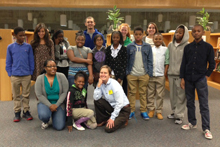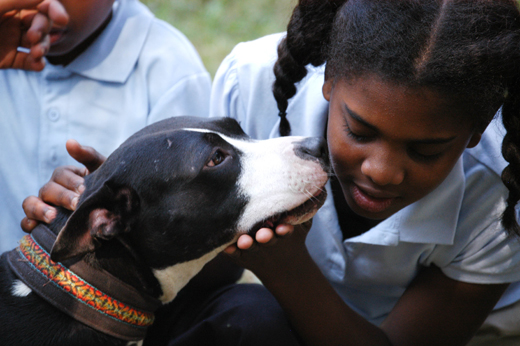Abby, an outgoing rescue dog, did not want to leave the children. Nor did any of the other dogs. The elementary school children would have been delighted to spend the rest of that sunny autumn afternoon petting and romping in the schoolyard with their new canine friends as part of an Emory community program. But the school day was coming to an end. The dogs had to return to the animal rescue shelter and the children to their after-school program.

Emory professor Donna Troka (front row, center) used a CFCP mini-grant for an engaged-learning program with the Atlanta Public Schools.
Emory professor Donna Troka and her students helped direct the children back to the school building, and the handlers from the shelter took charge of the dogs. Abby was so reluctant to leave that her handler had to scoop her up in his arms, no small feat since the friendly, tail-wagging 2-year-old canine is a muscular, 45-pound pit bull.
If any canine breed today can use some positive public relations, it's the pit bull, according to Troka, associate director of Emory's Center for Faculty Development and Excellence and adjunct assistant professor in the Graduate Institute for Liberal Arts. The school children's encounter with the oft-misunderstood breed was one of several that Troka arranged as part of her fall 2013 engaged-learning undergraduate course, "The Dividing Lines: Pit Bulls, Identity, and Community," funded in part by Emory's Center for Community Partnerships (CFCP).
CFCP awards mini grants ranging from $800 to $2,500 to help Emory faculty members practice engaged-learning pedagogy and offer courses that allow students to apply classroom learning though research or service in communities. Such a grant supported Troka's collaboration with CFCP's Graduation Generation program, a dropout prevention partnership with the Atlanta Public Schools and a range of community organizations.
Troka and her American Studies students explored the historical and present day perceptions of pit bull dogs. The course examined relationships between this canine breed and issues of race, class, gender and community development.
Troka collaborated with the LifeLine Animal Project, a no-kill shelter that provides animal rescue and adoption services for DeKalb and Fulton counties. "Both counties once had kill rates of 60 percent or higher for rescued dogs," says Troka. "That rate has dropped to less than half since Lifeline took over the county shelters."
Emory students shared their knowledge from the course with teachers and students in four Atlanta public schools, with the goal of beginning to transform local communities' understandings of animal welfare in general and pit bulls more specifically.
Working with Graduation Generation's STEM Clubs at Toomer Elementary and Whitefoord Elementary Schools, the university students developed a workshop for more than 70 students in grades 3-5 on classifying dogs by breed, dog behavior, how to safely approach a dog, and how to care for one.
Through Graduation Generation and the Afterschool All Stars at King Middle School, Emory students worked with 15 middle school students to publish a book. "Paws for Change: The Furry Fiction Anthology" includes stories about five LifeLine dogs, written and illustrated by the children. It is available for purchase online.
Collaborating with Graduation Generation staff and Maynard Jackson High School's broadcast/video production class and dog trainer Anna Bettina, Emory students worked with about 15 high school students to develop a public service announcement video about the benefits of force-free training for dogs.
"The most rewarding part of the collaboration was seeing the younger [middle school] students excited about our project. They were engaged with us throughout our time with them and came up with incredible ideas that truly enhanced our work," says Hilary Aviela Lerner, one of the participating Emory students and a senior anthropology major. "The collaboration was a great success."

